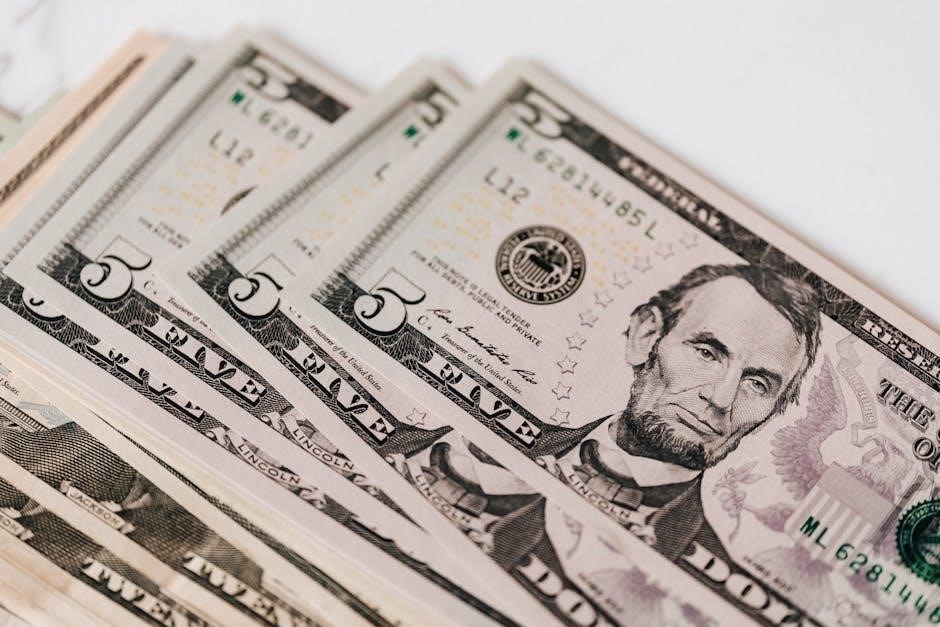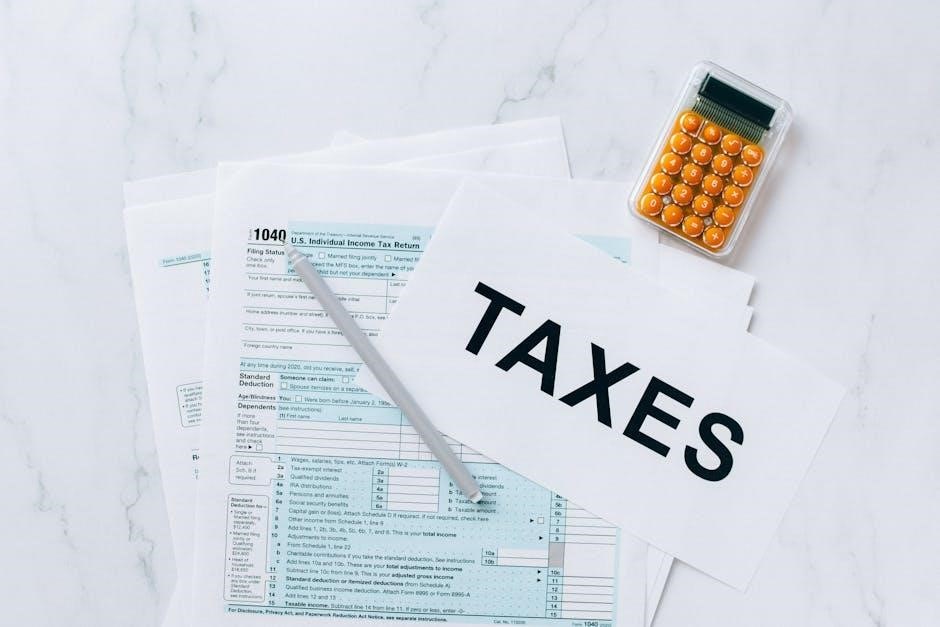The Philadelphia Net Profits Tax (NPT) is a key component of the city’s tax framework, generating revenue from individuals and businesses earning income within its jurisdiction. It applies to both residents and non-residents conducting business in Philadelphia, with a tax rate of 3.92% for taxable net profits. The NPT helps fund public services and infrastructure projects, making it essential for the city’s economic growth and development.
1.1 Overview of the NPT
The Philadelphia Net Profits Tax (NPT) is levied on the net profits of businesses, self-employed individuals, and residents operating within the city. It applies to income earned within Philadelphia, regardless of residency, with a tax rate of 3.92%. The NPT is a critical revenue source for funding public services, infrastructure, and community programs, benefiting residents and businesses alike.
1.2 Importance of the NPT in Philadelphia’s Tax Framework
The NPT is a cornerstone of Philadelphia’s tax system, providing significant revenue to fund essential city services, infrastructure, and economic development initiatives. By taxing net profits, it ensures businesses and self-employed individuals contribute fairly to the city’s growth. The NPT rate of 3.92% plays a vital role in maintaining fiscal stability and supporting community programs, making it indispensable to Philadelphia’s financial health.
Who Needs to Pay the Net Profits Tax?
The Net Profits Tax applies to Philadelphia residents, including self-employed individuals and businesses operating within the city. Non-residents conducting business in Philadelphia may also be required to pay this tax, depending on their income sources and business activities.
2.1 Philadelphia Residents and Non-Residents
The Net Profits Tax applies to all Philadelphia residents, including self-employed individuals, regardless of where their business is conducted. Non-residents who earn income from a business or profession within Philadelphia may also be subject to the tax, depending on their specific activities and income sources within the city.
2.2 Businesses and Self-Employed Individuals
The Net Profits Tax applies to businesses operating in Philadelphia and self-employed individuals, regardless of where their business is conducted. Both resident and non-resident businesses generating income within the city are subject to the tax on their net profits. Self-employed individuals, even those whose businesses are outside Philadelphia, must report and pay the tax on their earnings.
Important Dates and Deadlines
The Net Profits Tax return is due annually by April 15. Estimated tax payments are due on April 15, June 15, and September 15, with a final payment by January 15 of the following year. Extensions may be granted, but penalties apply for late filings or payments.
3.1 Filing Requirements and Deadlines
The Net Profits Tax (NPT) return must be filed annually by April 15. If April 15 falls on a weekend or holiday, the deadline shifts to the next business day. Quarterly estimated tax payments are due on April 15, June 15, September 15, and January 15 of the following year. Extensions may be granted, but late filing or payment penalties apply.
3.2 Payment Due Dates for Estimated Taxes
The Net Profits Tax requires estimated tax payments, with the first installment due by April 15 and the second by June 15. Payments must be made quarterly, ensuring timely compliance to avoid penalties. Missing deadlines may result in interest charges, emphasizing the importance of adhering to these scheduled due dates for accurate tax compliance.

Filing the Net Profits Tax Return
The Net Profits Tax return can be filed online or manually, requiring accurate documentation. Forms and instructions are available on the Philadelphia Department of Revenue’s website for easy access.
4.1 Online Filing Process
To file the Net Profits Tax return online, visit the Philadelphia Department of Revenue’s website. Log in to your tax account or create one if you don’t have it. Complete the e-file form, enter required information, and upload necessary documents; Payment can be made online with a credit card, though a convenience fee applies. Ensure all details are accurate before submission.
4.2 Manual Filing and Required Documentation
For manual filing, obtain the Net Profits Tax (NPT) form from the Philadelphia Department of Revenue website. Complete the form accurately, attaching required documents like Schedule C for self-employed individuals or 1099 forms for income verification. Submit the form to 1401 John F. Kennedy Boulevard. Ensure all calculations are correct and retain a copy for your records.
Calculating the Net Profits Tax
Calculating the Net Profits Tax involves determining taxable income, applying deductions, and applying the 3.92% tax rate on net profits for Philadelphia residents and businesses.
5.1 Determining Taxable Income
Determining taxable income for the Net Profits Tax involves calculating gross income from all sources, including business profits, self-employment, and rental income. Deduct allowable business expenses, such as operating costs, depreciation, and other legitimate deductions, to arrive at net profits. For non-residents, only income earned within Philadelphia is subject to the tax, requiring apportionment of income based on business activity within the city.
5.2 Allowable Deductions and Exemptions
Allowable deductions for the Net Profits Tax include business expenses, depreciation, and operating costs. Certain entities, such as tax-exempt organizations, may qualify for exemptions. Self-employed individuals can deduct home office expenses, while businesses may claim deductions for rent and utilities. Specific exemptions apply to income earned outside Philadelphia for non-residents, reducing taxable income accordingly.
5.3 Calculating the Tax Liability
To calculate the Net Profits Tax liability, apply the 3.92% tax rate to taxable income after allowable deductions. Income is reported on the NPT return, with deductions subtracted from total profits. Businesses and self-employed individuals must file both NPT and BIRT forms. Payments can be made online or by mail using preprinted coupons. Ensure accurate reporting to avoid penalties and maintain compliance with city tax regulations.
Tax Rates and Exemptions
The Philadelphia Net Profits Tax (NPT) is currently taxed at a rate of 3.92% of taxable income. Certain organizations, such as nonprofits, may qualify for exemptions under specific conditions.
6.1 Current Tax Rates for NPT
The current tax rate for Philadelphia’s Net Profits Tax (NPT) is 3.92%. This rate applies to both Philadelphia residents and non-residents conducting business within the city. The tax is levied on net profits from businesses, professions, or other activities, helping fund essential public services and infrastructure projects crucial for the city’s economic development.
6.2 Eligibility for Tax Relief Programs
Eligibility for Philadelphia Net Profits Tax relief programs varies based on income levels, business size, and specific criteria. Certain businesses and individuals may qualify for exemptions or reduced rates under city ordinances. The Philadelphia Department of Revenue provides detailed guidelines and applications for these programs, ensuring equitable access to tax relief for eligible entities.
Apportioning Income for Non-Philadelphia Residents
Non-Philadelphia residents must apportion income based on business activities within the city. This ensures only income earned in Philadelphia is subject to the Net Profits Tax.
7.1 How to Apportion Income
Non-Philadelphia residents must apportion income based on business activities conducted within the city. Use Line 5 of the NPT return to report the apportioned income. This ensures only income earned in Philadelphia is taxed. The filing deadline is April 15 annually, unless it falls on a weekend, in which case it moves to the next business day.
7.2 Special Considerations for Out-of-State Businesses
Out-of-state businesses must obtain a Philadelphia tax account number to file NPT returns. They should apportion income based on business activities within the city and may need to file additional forms. The Philadelphia Department of Revenue provides guidance for non-resident businesses, ensuring compliance with local tax regulations. Visit their website for specific instructions and required documentation.
Accessing Forms and Instructions
Visit the Philadelphia Department of Revenue website to download NPT forms and instructions. Forms for BIRT, NPT, and other taxes are available for easy access online.
8.1 Where to Find NPT Forms
The Philadelphia Department of Revenue website offers downloadable NPT forms, including BIRT and other related documents. Visit the official website to access these resources conveniently.
8.2 Navigating the Philadelphia Department of Revenue Website
The Philadelphia Department of Revenue website provides a user-friendly interface to access NPT forms and instructions. Visit www.phila.gov/revenue and navigate to the dedicated tax section. Use the search bar or menu to locate specific forms, such as the Net Profits Tax Return. Follow on-screen instructions for online filing or downloading forms, ensuring compliance with all requirements.
Amending or Correcting a Return
To amend or correct a Net Profits Tax return, file an amended return if errors or omissions are identified. An automatic 60-day extension is granted for filing, ensuring accuracy and compliance with tax requirements.
9.1 When and How to File an Amended Return
If errors or omissions are identified in your Net Profits Tax return, you must file an amended return. Submit corrected forms and supporting documentation to the Philadelphia Department of Revenue. Ensure accuracy in recalculating taxable income and tax liability. Late filing may result in penalties, so timely correction is essential for compliance and avoiding additional charges.
9.2 Addressing Errors or Omissions
Accuracy is crucial when submitting your Net Profits Tax return. Review your filing for errors or omissions, such as incorrect income reporting or overlooked deductions. If discrepancies are found, correct them promptly to avoid penalties. Submit amended documentation and ensure compliance with all tax regulations. Timely corrections prevent additional charges and ensure proper reconciliation of your tax liability.

Penalties and Enforcement
Failure to comply with NPT regulations may result in penalties, including late filing fees and interest on unpaid taxes. The Philadelphia Department of Revenue audits returns to ensure compliance.
10.1 Consequences of Late Filing or Payment
Failure to file or pay NPT on time results in penalties, including late filing fees and interest on unpaid taxes. The Philadelphia Department of Revenue may impose additional charges, and unresolved issues could lead to audits or legal action. Timely filing and payment are crucial to avoid these consequences and ensure compliance with tax regulations.
10.2 Audit and Compliance Processes
The Philadelphia Department of Revenue conducts audits to ensure compliance with NPT regulations. Taxpayers may be selected for audit based on income discrepancies or filing inconsistencies. During audits, documentation such as financial records and tax returns are reviewed. Non-compliance can lead to penalties, fines, or additional tax liabilities. Maintaining accurate records and timely responses are essential for a smooth process.

Resources and Support
The Philadelphia Department of Revenue offers comprehensive resources, including tax forms, instructions, and guides, on their official website. Taxpayers can access tools like NPT forms, BIRT returns, and contact support for assistance with filing and compliance.
11.1 Contacting the Philadelphia Department of Revenue
The Philadelphia Department of Revenue can be contacted for NPT-related inquiries through phone, email, or in-person visits. Taxpayers can visit their official website for contact details, office hours, and additional resources. The department also provides online support and FAQs to assist with filing, payments, and compliance. Reach out for guidance on NPT forms, deadlines, and eligibility for tax relief programs.
11.2 Additional Tools and Guides
The Philadelphia Department of Revenue offers various tools to simplify NPT compliance, including tax calculators, instructional guides, and video tutorials. Their website provides detailed FAQs, downloadable forms, and a tax mapping tool to determine business obligations. These resources help taxpayers understand filing requirements, calculate liabilities, and ensure accurate submissions, making the NPT process more accessible and efficient for all filers.
The Philadelphia Net Profits Tax is a vital revenue source for funding public services and infrastructure, ensuring economic growth and development for the city and its residents.
12.1 Summary of Key Points
The Philadelphia Net Profits Tax (NPT) is a cornerstone of the city’s tax system, applying to residents, non-residents, and businesses operating within the city. With a tax rate of 3.92%, it generates essential revenue for public services and infrastructure. Compliance is crucial, and understanding the tax requirements ensures proper filing and payment, contributing to Philadelphia’s economic vitality and community well-being.
12.2 Final Tips for Compliance
Ensure timely filing and payment to avoid penalties. Stay informed about tax law updates and utilize the Philadelphia Department of Revenue’s resources. Maintain accurate records to simplify the filing process. For complex cases, consulting a tax professional is advisable to ensure adherence to all requirements and optimize tax obligations under the NPT framework.
